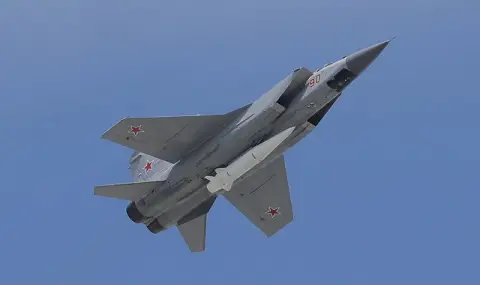Kremlin officials continue to baselessly threaten NATO countries for adhering to US President Donald Trump's goal of having Europe shoulder more of its own defense requirements. Russian Security Council Secretary Sergei Shoigu said in an interview with the Kremlin's TASS news agency, published on April 24, that Europe is preparing for a potential military conflict with Russia in three to five years.
This is stated in the daily analysis of the Institute for the Study of War (ISW).
Shoigu complained that Poland, Lithuania and Estonia are increasing their annual defense spending due to "an imaginary threat from the east". Shoigu said that alleged threats to the security, sovereignty and territorial integrity of Russia's "closest ally" Belarus persisted and that Russia had deployed Oreshnik ballistic missiles in Belarus because of these threats.
Shoigu recalled that amendments to Russia's nuclear doctrine from November 2024 allow Russia to use nuclear weapons in the event of aggression against Russia or Belarus, including aggression using conventional weapons. US President Donald Trump is pressing European countries and NATO members to increase their defense spending.
Lavrov and Peskov's apologies for European countries increasing their defense investments - as Trump has requested - are yet another indication that Moscow's demands for Europe's future security architecture are incompatible with Trump's goals for a strong and independent Europe that contributes more equitably to Europe's collective security.
Shoigu claims that European countries are increasing their military presence near the western borders of the Union State of Russia and Belarus and "are not showing any readiness to de-escalate the situation." Shoigu said that the European Union (EU) is trying to turn the EU into a "military organization directed against Russia" and criticized the EU's efforts to develop the European defense industrial base.
Shoigu said that the number of NATO military contingents deployed near Russia's western borders has increased 2.5 times in the past year. Shoigu said the number of military threats against Russia is growing, especially as the Baltic states build military bases on their territory, Poland buys armored vehicles, and various NATO countries modernize their air defenses and purchase American fighter jets.
Peskov claims that Russia has no territorial claims to the Baltic states, but Peskov points out that the Baltic authorities discriminate against Russian citizens living there.
Peskov went on to claim that Russia launched its first invasion of Ukraine in 2014 because the Ukrainian authorities were allegedly trying to "exterminate" the Russians in the country.
The European NATO countries that Peskov and Shoigu singled out in their complaints about the alleged militarization of Europe - Finland, Poland, and the Baltics - are particularly at risk due to their proximity to Russia. Helsinki, Finland; Tallinn, Estonia; and Riga, Lithuania are located about 160 km, 190 km, and 215 km from Russia's Leningrad and Pskov regions, respectively. Vilnius, Latvia, and Warsaw, Poland, are about 160 km and 230 km from Kaliningrad, respectively.
In contrast, Moscow is about 600 km from the Russian-Latvian border, NATO's closest state border.
Shoigu's thinly veiled nuclear threats against NATO are part of the Kremlin's broader campaign of reflexive control, aimed at influencing Western decision-making in favor of Russia and against Western countries' own interests. Shoigu’s nuclear threats are an attempt to push European countries to self-restrain and reduce their defensive buildups — leaving NATO’s eastern border largely unprotected.
These reflexive control efforts are in line with Russian President Vladimir Putin’s 2021 request, before launching his full-scale invasion of Ukraine, that NATO not deploy military forces in countries that became NATO members after 1997, including Poland, Estonia, Latvia, Lithuania, and Poland.
Peskov and Lavrov's threatening statements against NATO members Finland, Poland, Estonia, Latvia and Lithuania are parallel to other statements by Kremlin officials that are likely intended to create information conditions in support of Russia's efforts to seize territory in Eastern Europe, the South Caucasus and Central Asia. On April 14, Russian Foreign Minister Sergei Lavrov said it was "dangerous" when "fascists seize lands that have never belonged to anyone except the Russian Empire and the Soviet Union" and do "disgusting things" there.
Lavrov's statement shows that the Kremlin views the independent states once colonized by the Soviet Union and the Russian Empire as legitimate parts of modern Russia. Russian presidential aide and former Security Council secretary Nikolai Patrushev also recently threatened Finland, using narratives similar to those the Kremlin has used to justify its invasions of Ukraine.
